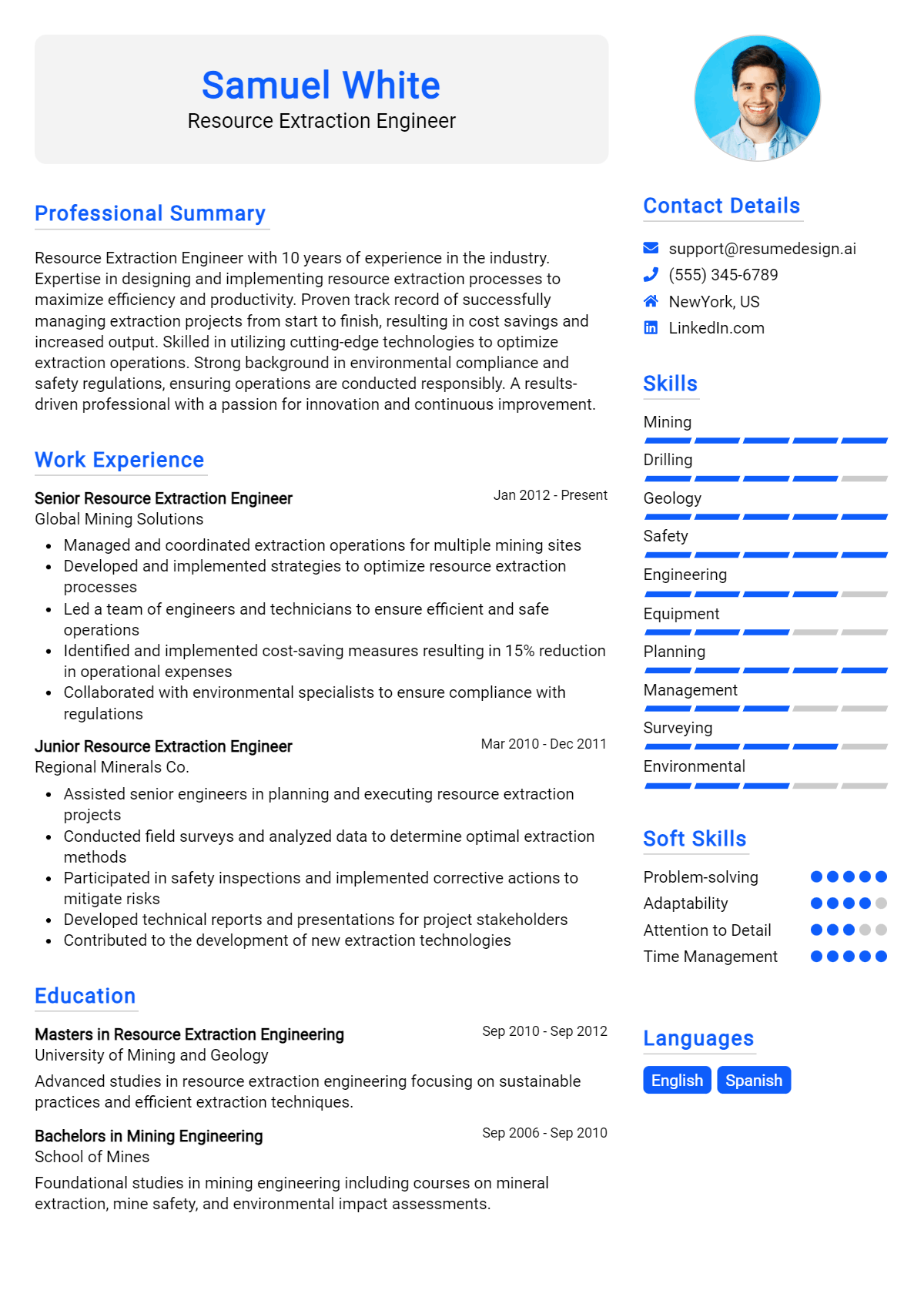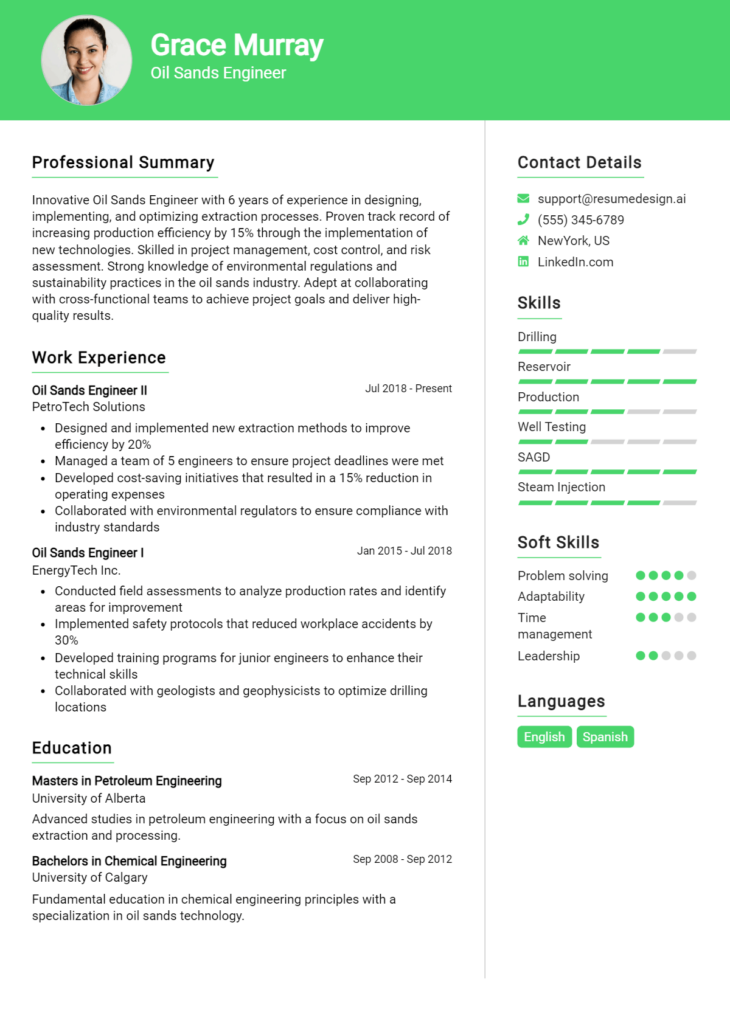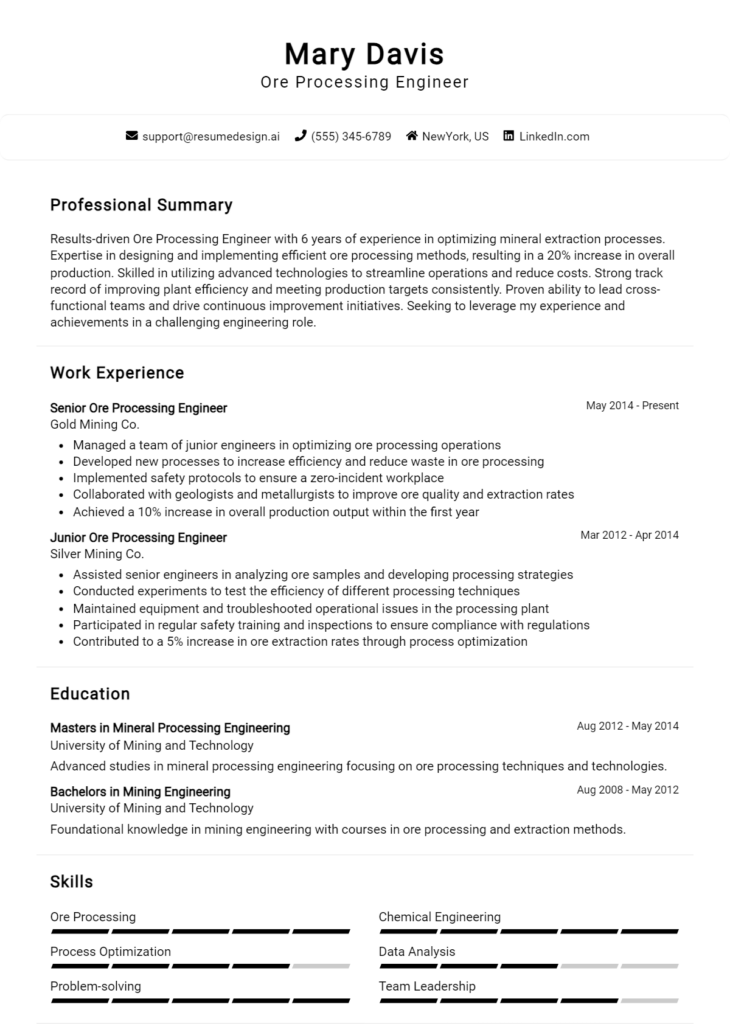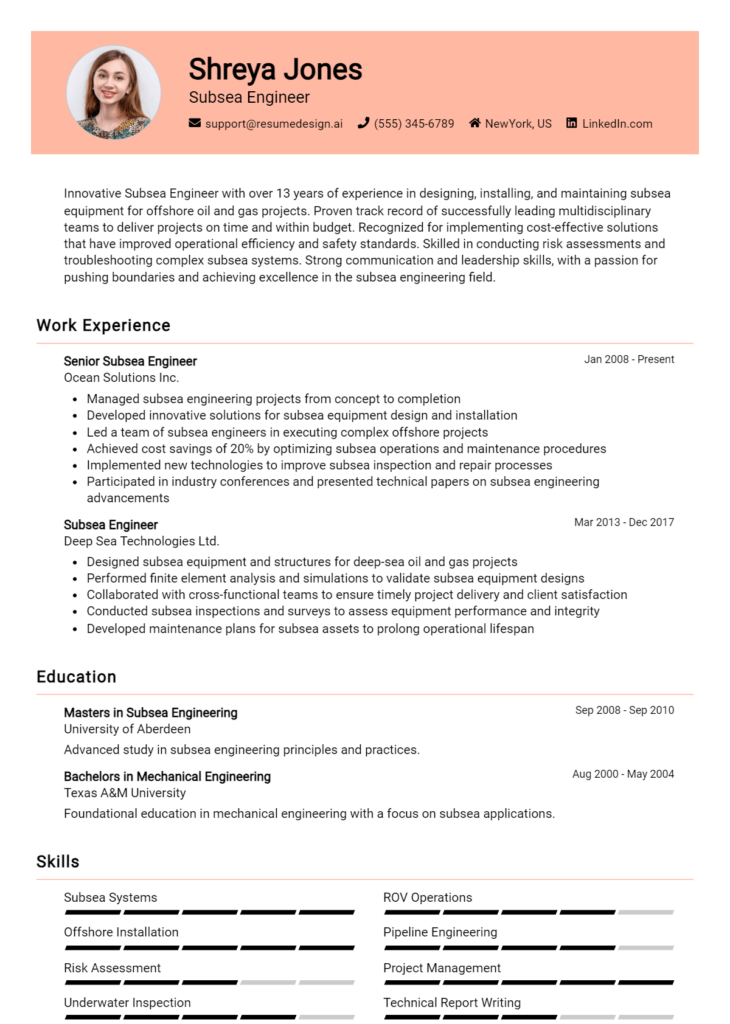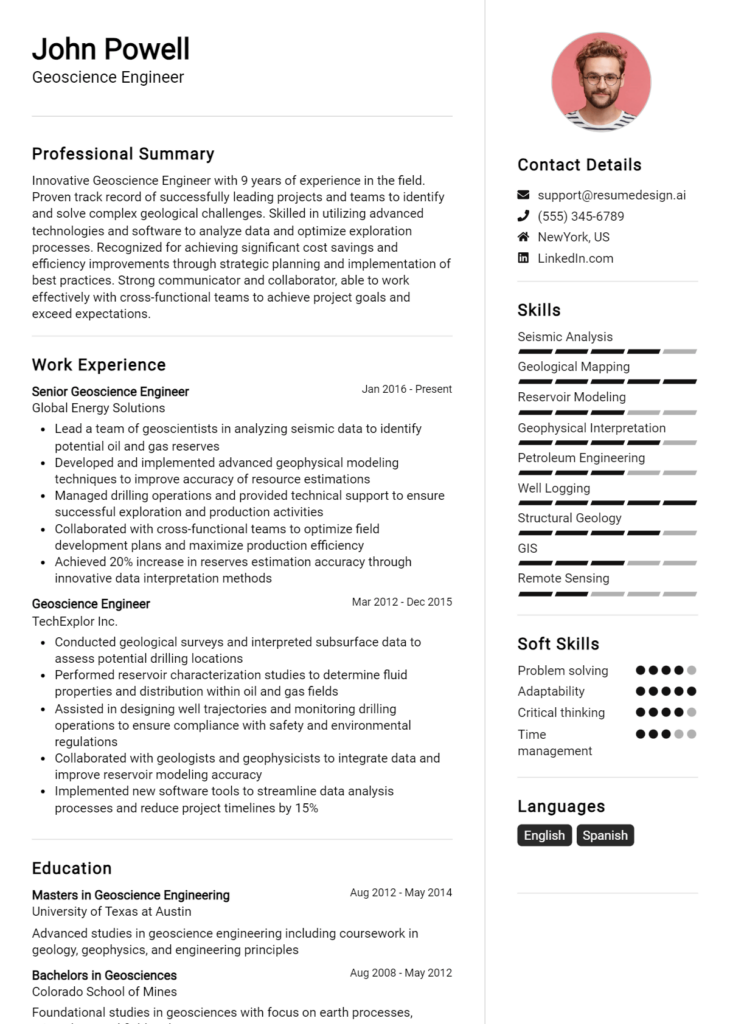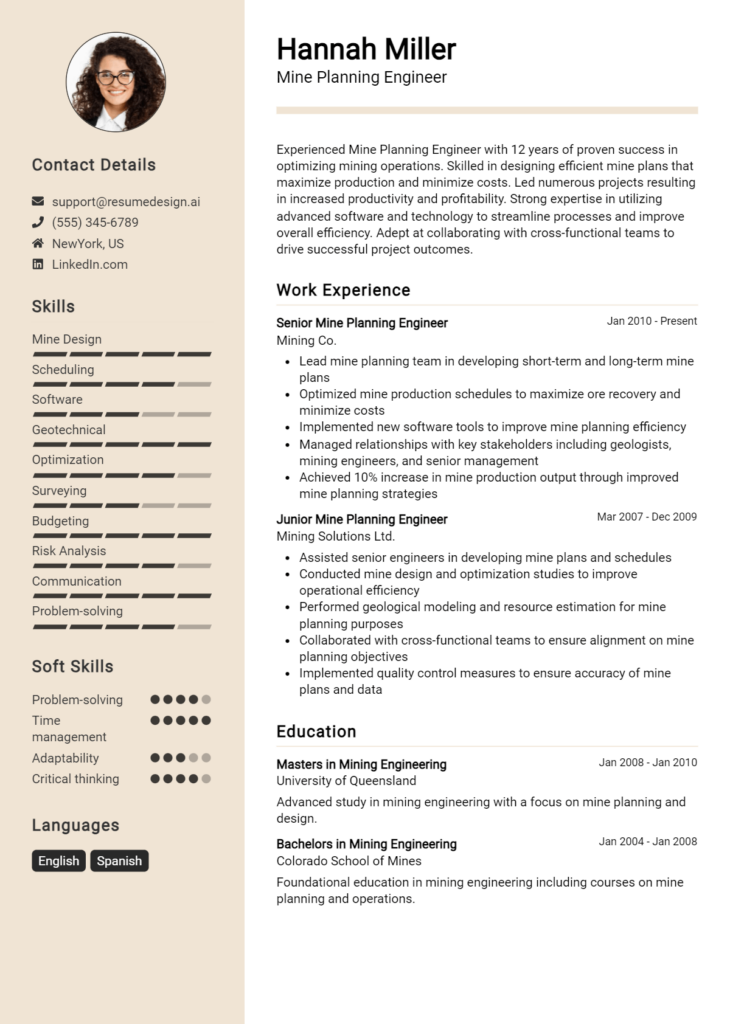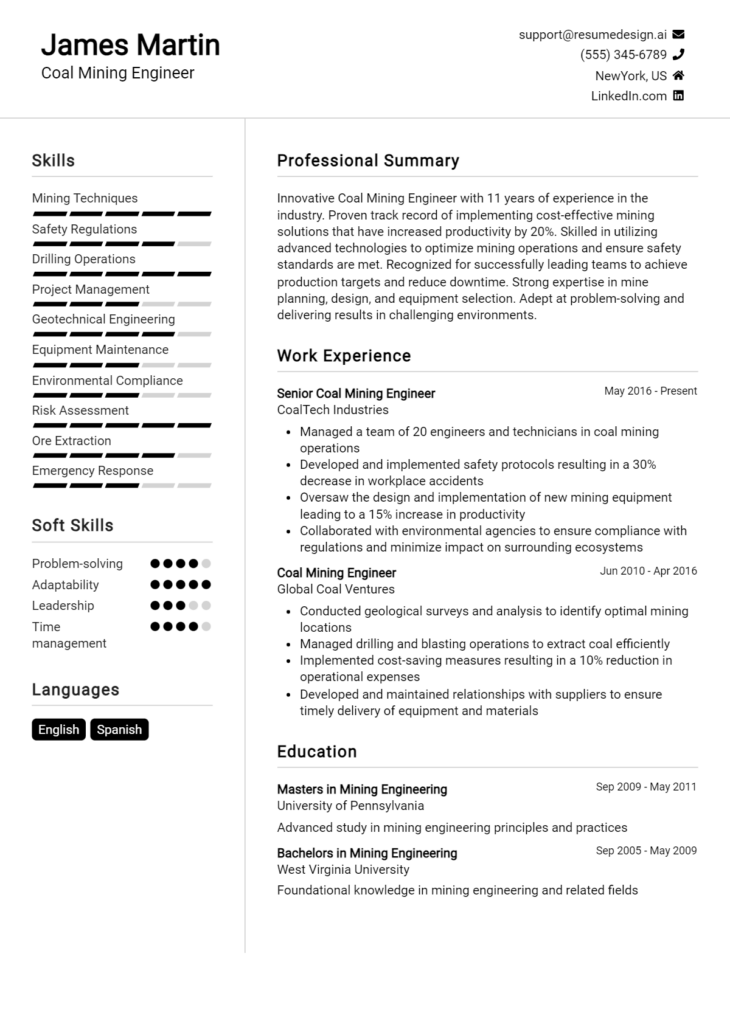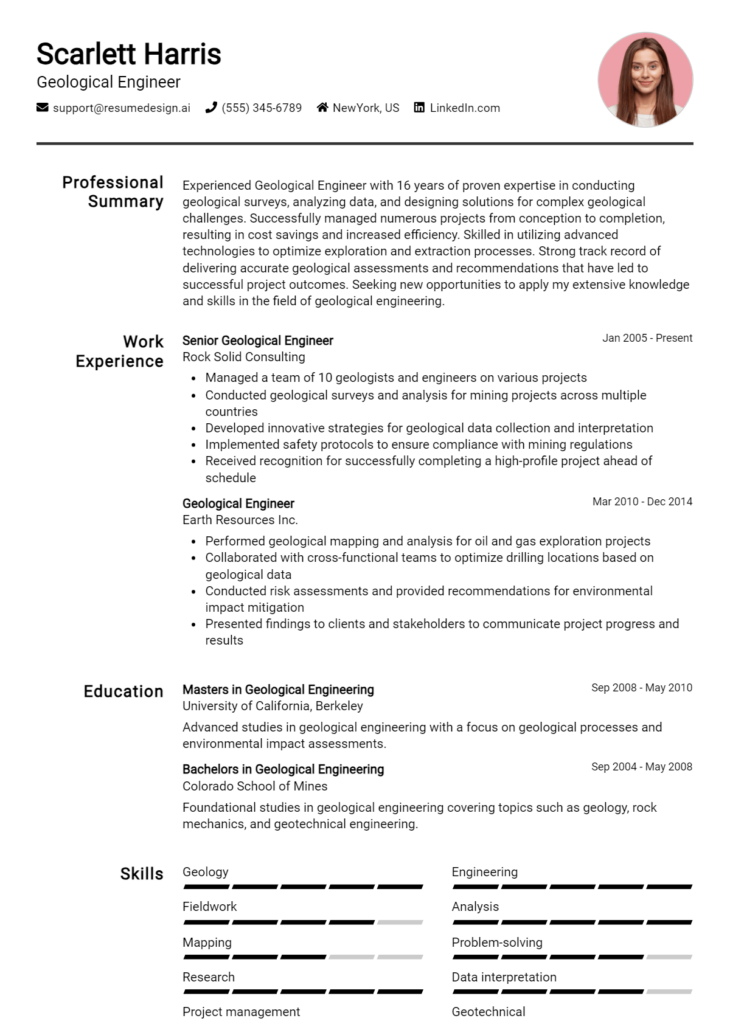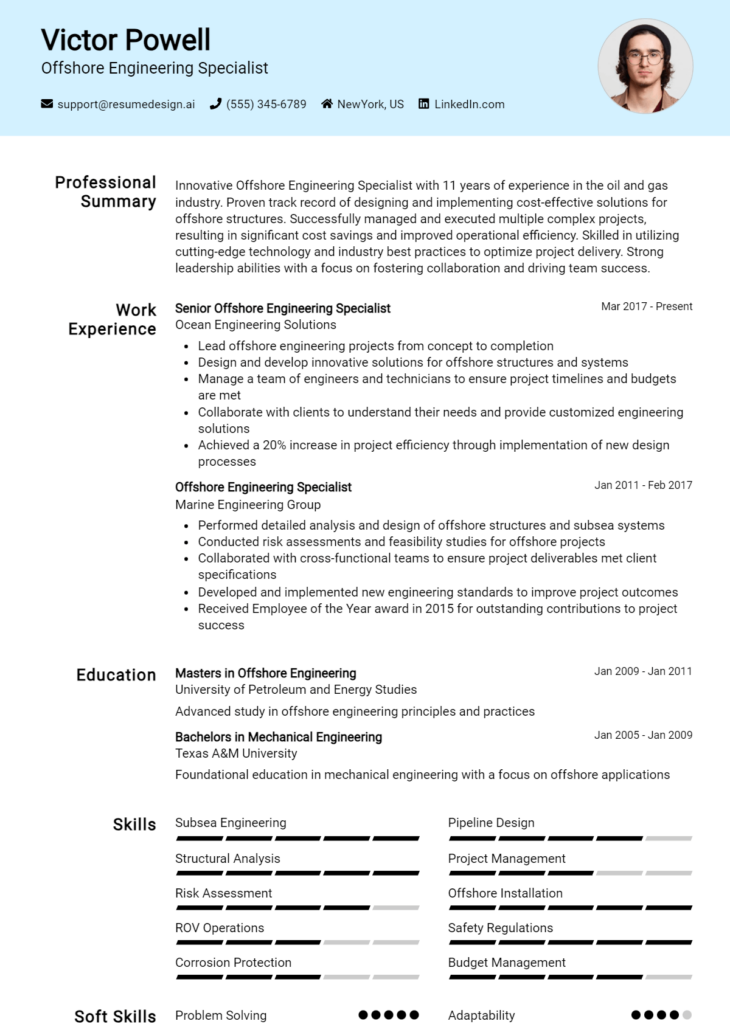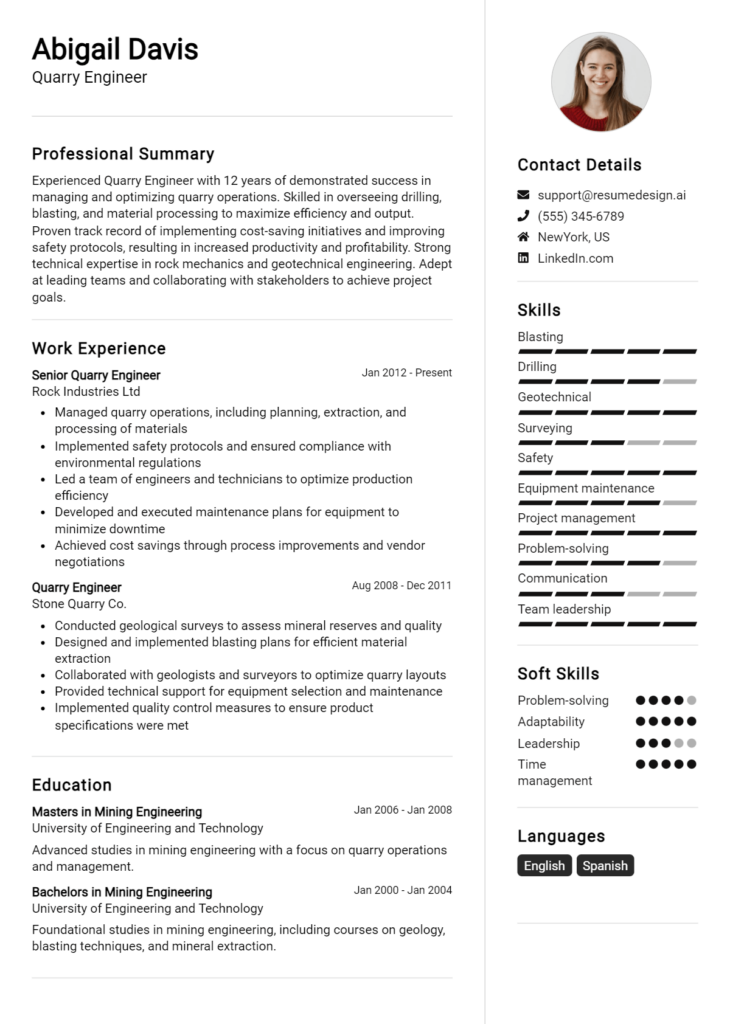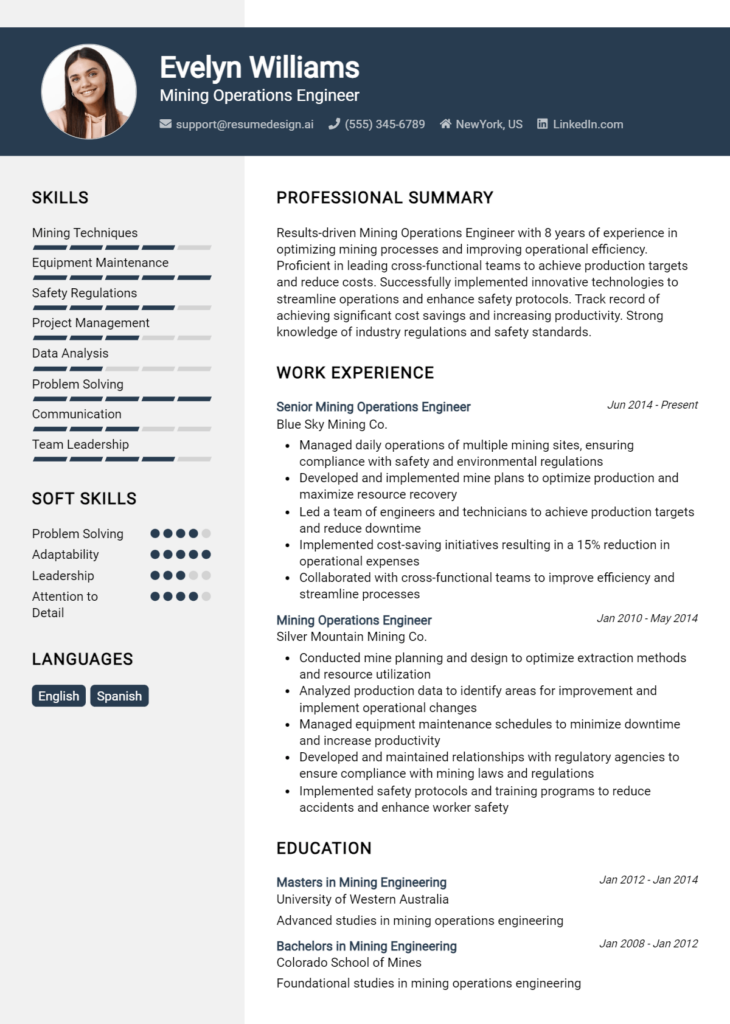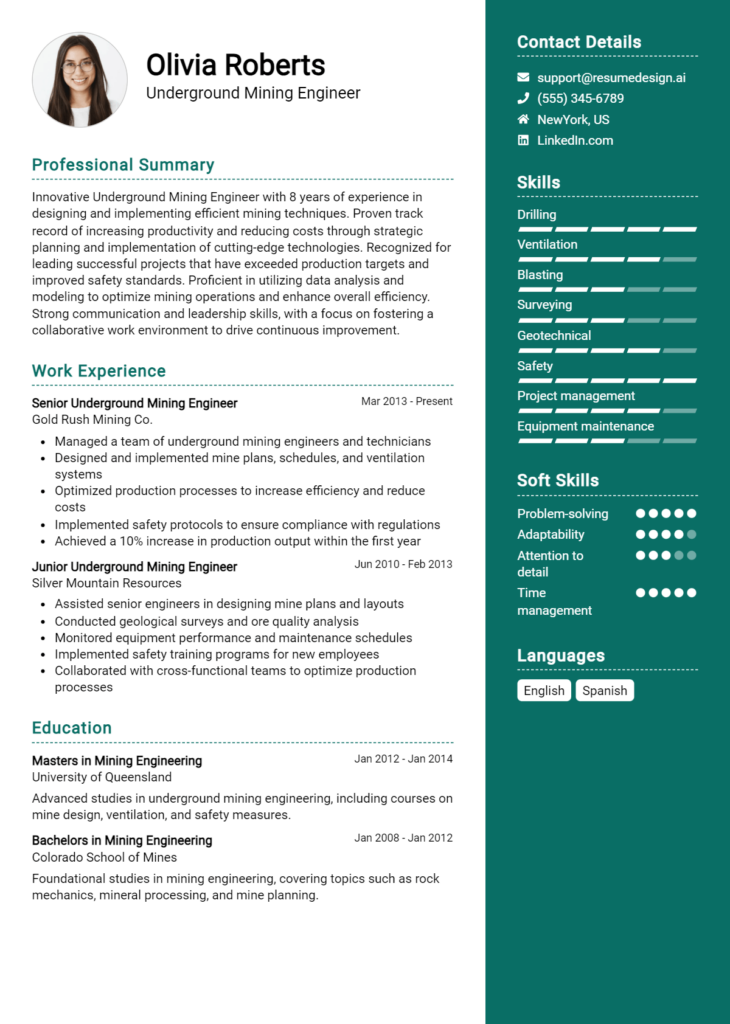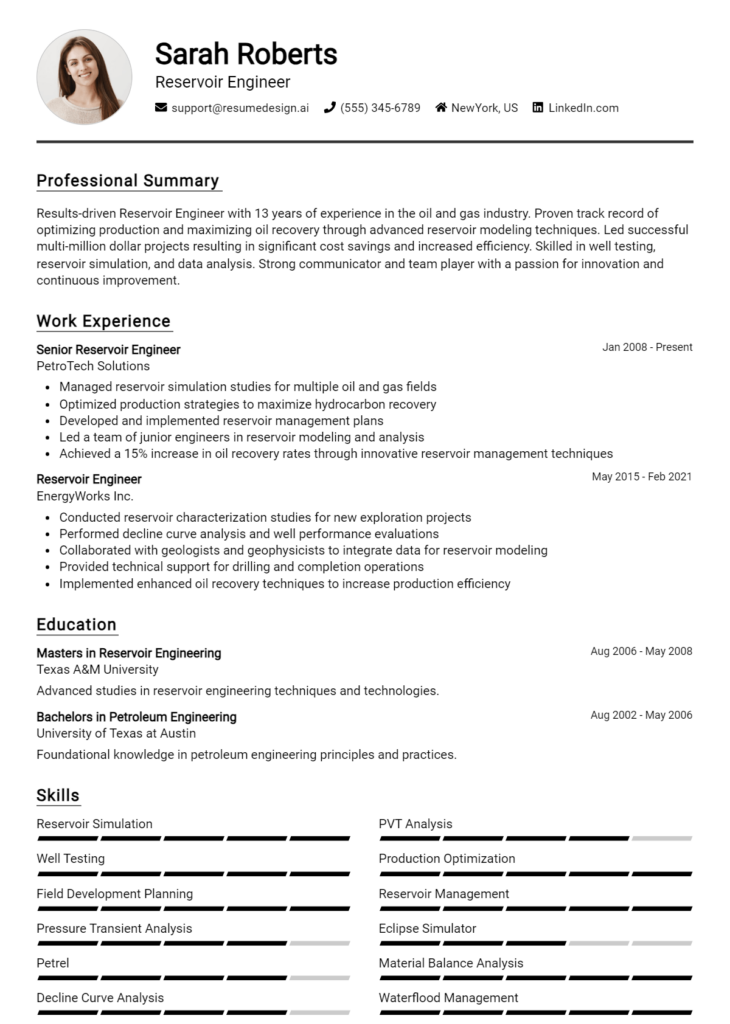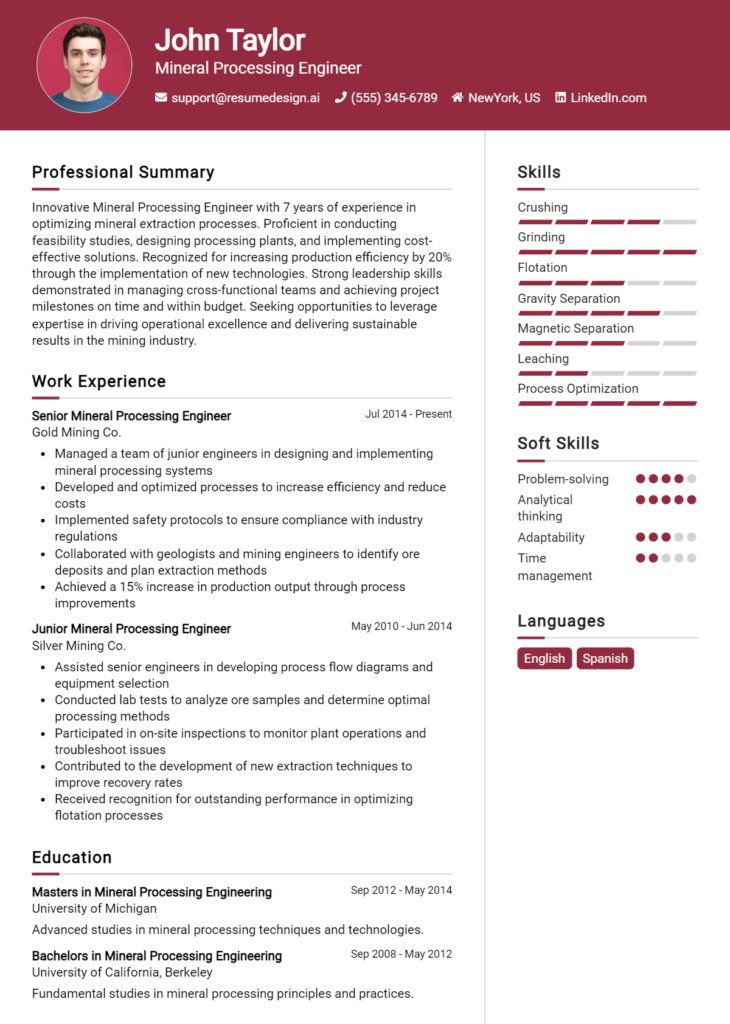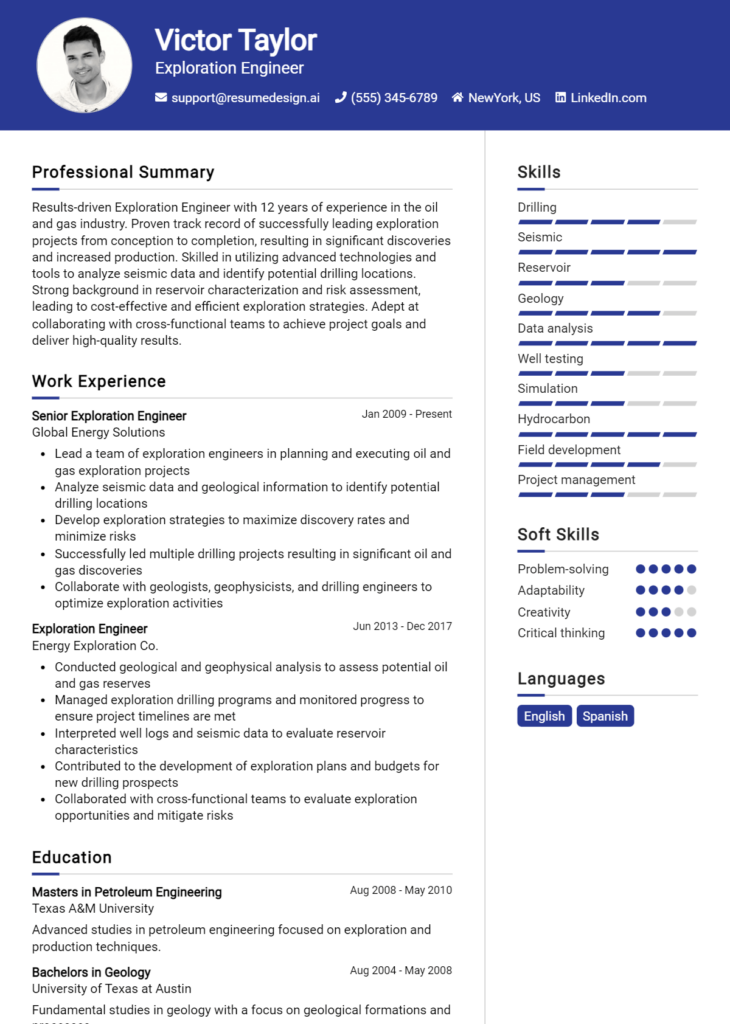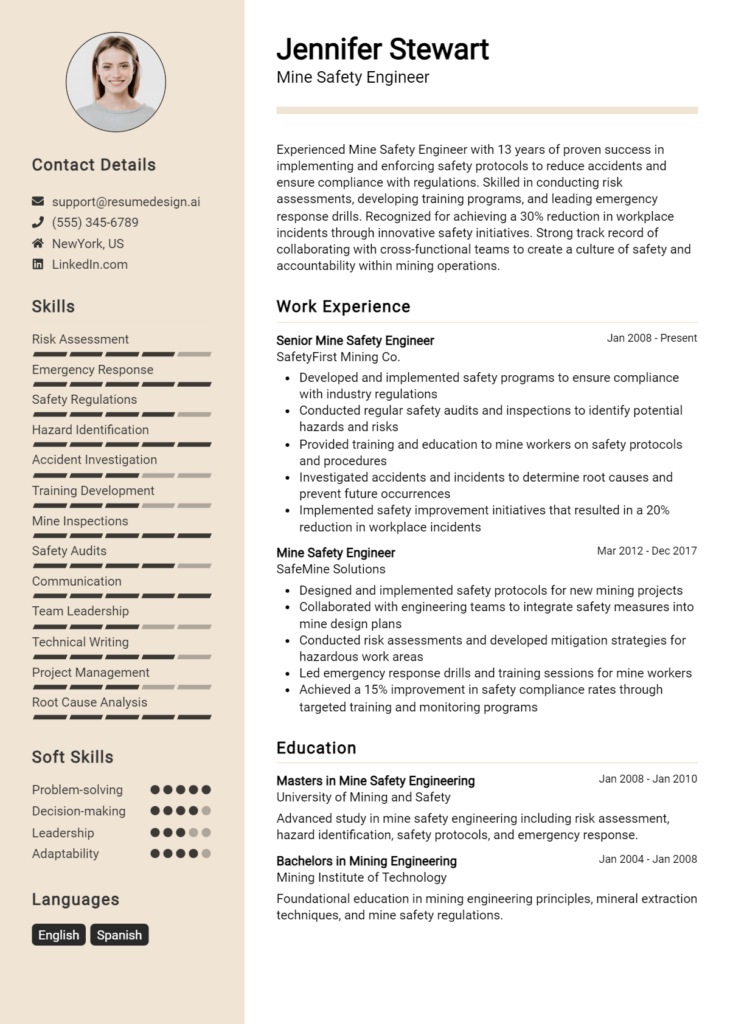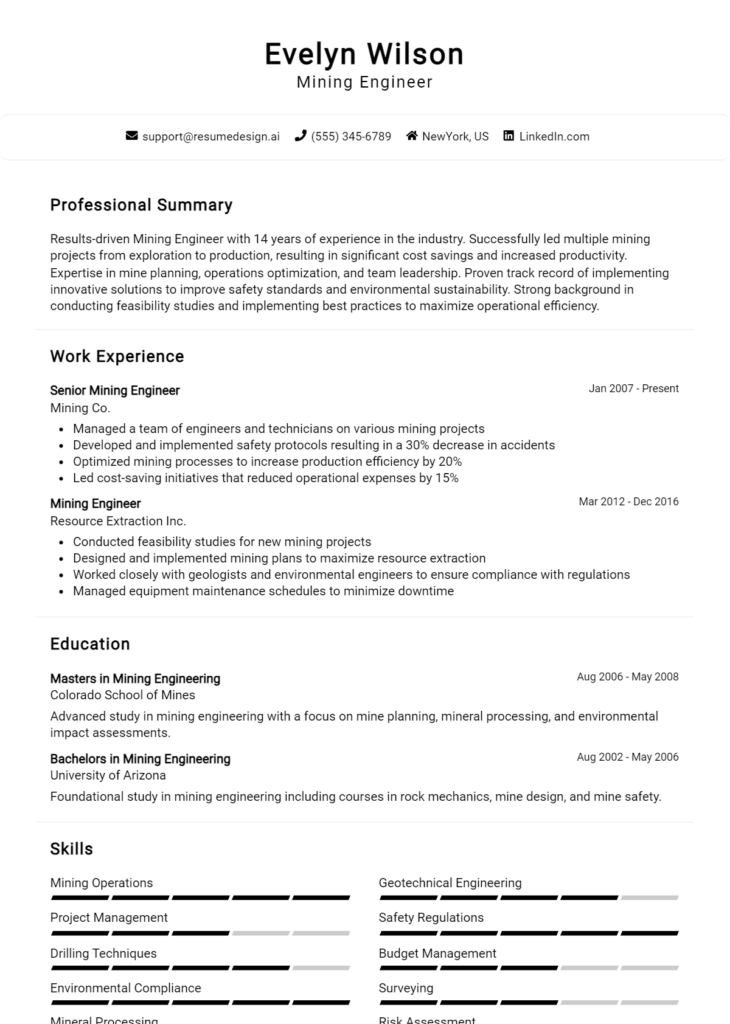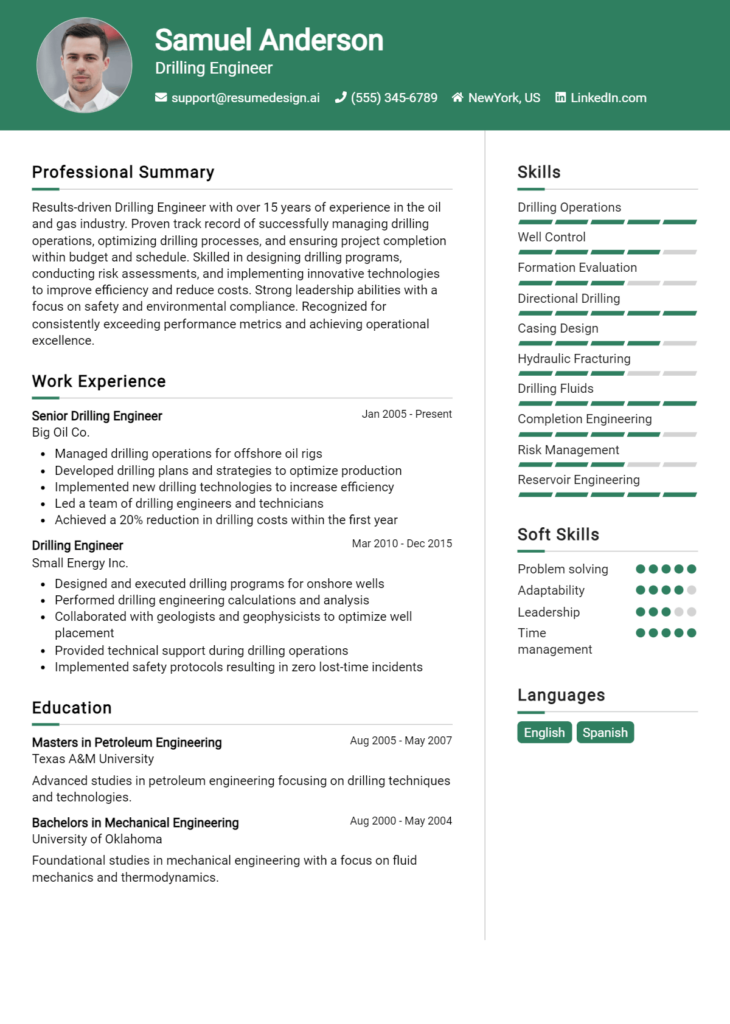Resource Extraction Engineer Core Responsibilities
A Resource Extraction Engineer plays a pivotal role in the mining and extraction industries, ensuring the efficient and sustainable recovery of resources. This professional bridges various departments, such as geology, environmental science, and operations, requiring a blend of technical expertise, operational acumen, and strong problem-solving skills. Success in this role demands the ability to analyze data, design extraction processes, and collaborate effectively with cross-functional teams, ultimately contributing to the organization’s productivity and sustainability goals. A well-structured resume that highlights these qualifications can significantly enhance job prospects in this competitive field.
Common Responsibilities Listed on Resource Extraction Engineer Resume
- Design and optimize resource extraction processes to maximize efficiency.
- Conduct geological surveys and analysis to identify resource locations.
- Collaborate with environmental teams to ensure compliance with regulations.
- Develop and implement safety protocols for extraction operations.
- Oversee the planning and execution of drilling and extraction projects.
- Analyze data to improve extraction methods and reduce costs.
- Prepare detailed reports and presentations for stakeholders.
- Coordinate with engineering and operations teams to streamline workflows.
- Manage budgets and resources effectively during projects.
- Conduct feasibility studies for new extraction sites.
- Stay updated on industry trends and technological advancements.
- Provide training and guidance to junior engineers and field staff.
High-Level Resume Tips for Resource Extraction Engineer Professionals
In the competitive field of resource extraction engineering, a well-crafted resume is essential for making a strong first impression on potential employers. Your resume serves as a marketing tool that showcases your skills, experiences, and achievements, setting the stage for your candidacy. A standout resume not only presents your qualifications but also reflects your understanding of the industry and its demands. This guide will provide practical and actionable resume tips specifically tailored for Resource Extraction Engineer professionals, helping you to effectively communicate your value to prospective employers.
Top Resume Tips for Resource Extraction Engineer Professionals
- Tailor your resume to match the job description by using relevant keywords and phrases that align with the specific requirements of the position.
- Showcase your relevant experience prominently, focusing on roles that highlight your expertise in resource extraction methods, technologies, and regulatory compliance.
- Quantify your achievements by including specific metrics, such as the amount of resources extracted or the percentage of efficiency improvements achieved in past projects.
- Highlight industry-specific skills, such as proficiency in geological analysis, project management, and knowledge of environmental regulations.
- Include certifications and licenses that are relevant to the resource extraction sector, such as safety certifications or specialized training courses.
- Utilize a clean and professional format that enhances readability, ensuring that your most important information stands out to recruiters.
- Incorporate action verbs to convey your contributions effectively, using words like "engineered," "developed," and "led" to describe your roles.
- Keep your resume concise, ideally one to two pages, while ensuring that every detail is relevant to the job you are applying for.
- Proofread your resume multiple times to eliminate any typos or grammatical errors that could detract from your professionalism.
By implementing these tips, you will significantly enhance your chances of landing a job in the Resource Extraction Engineer field. A polished and targeted resume can be the key to catching the attention of hiring managers and securing interviews, ultimately paving the way for a successful career in this vital industry.
Why Resume Headlines & Titles are Important for Resource Extraction Engineer
In the competitive field of resource extraction engineering, a well-crafted resume headline or title serves as a critical first impression for job seekers. A strong headline can instantly capture the attention of hiring managers, succinctly summarizing a candidate's key qualifications and setting the tone for the rest of the resume. It should be concise, relevant, and tailored to the specific job being applied for, allowing hiring professionals to quickly identify the candidate's strengths and suitability for the role. A compelling headline not only enhances visibility but also conveys professionalism and clarity, making it an essential element in the job application process.
Best Practices for Crafting Resume Headlines for Resource Extraction Engineer
- Keep it concise: Aim for one impactful phrase that summarizes your qualifications.
- Be role-specific: Tailor the headline to reflect the specific position you are applying for.
- Highlight key skills: Incorporate industry-specific skills that are relevant to resource extraction engineering.
- Use impactful language: Choose strong, active words that convey confidence and expertise.
- Avoid jargon: Use clear language that is easily understood by all hiring managers.
- Showcase achievements: If possible, include quantifiable accomplishments to strengthen the headline.
- Make it unique: Stand out by avoiding generic titles and crafting a headline that reflects your individual strengths.
- Align with job description: Mirror the language in the job posting to demonstrate a direct match with the employer’s needs.
Example Resume Headlines for Resource Extraction Engineer
Strong Resume Headlines
Innovative Resource Extraction Engineer Specializing in Sustainable Practices
Experienced Engineer with 10+ Years in Mineral Resource Management and Optimization
Results-Driven Resource Extraction Engineer with Proven Leadership in Project Development
Dynamic Geotechnical Engineer Focused on Efficient Resource Recovery Solutions
Weak Resume Headlines
Engineer Looking for Work
Resource Extraction Professional
Seeking Opportunities in Engineering
The strong headlines are effective because they are specific and convey the candidate's unique strengths, skills, and experiences directly related to the resource extraction engineering field. They use impactful language that resonates with hiring managers and clearly articulate the candidate's value proposition. In contrast, the weak headlines lack specificity and fail to differentiate the candidate from others, making them forgettable and less likely to attract attention. Strong headlines create a compelling narrative that invites hiring managers to learn more, while weak ones leave a lackluster impression that may lead to disinterest.
Writing an Exceptional Resource Extraction Engineer Resume Summary
A resume summary is a crucial component for a Resource Extraction Engineer, as it serves as the first impression a candidate makes on potential employers. A well-crafted summary quickly captures the attention of hiring managers by highlighting key skills, relevant experience, and notable accomplishments that align with the job requirements. It sets the tone for the rest of the resume, providing a concise and impactful snapshot of the candidate's qualifications. Tailoring the summary to the specific job the candidate is applying for ensures it resonates with the employer's needs, enhancing the chances of securing an interview.
Best Practices for Writing a Resource Extraction Engineer Resume Summary
- Quantify achievements: Use numbers and metrics to demonstrate the impact of your work.
- Focus on relevant skills: Highlight technical skills and knowledge that are directly applicable to resource extraction.
- Tailor the summary: Customize the content to reflect the specific job description and company values.
- Keep it concise: Aim for 2-4 sentences that deliver maximum information in minimal words.
- Showcase industry experience: Include years of experience and types of projects you've worked on.
- Highlight key accomplishments: Mention awards, recognitions, or successful projects that distinguish you from other candidates.
- Use strong action verbs: Start sentences with powerful verbs to convey confidence and proactivity.
- Maintain a professional tone: Ensure the language used is formal and appropriate for the engineering field.
Example Resource Extraction Engineer Resume Summaries
Strong Resume Summaries
Resource Extraction Engineer with over 8 years of experience in optimizing mineral extraction processes, resulting in a 30% increase in yield efficiency. Proven track record in implementing sustainable mining practices and leading cross-functional teams to achieve safety and environmental compliance.
Dynamic Resource Extraction Engineer adept at utilizing advanced geological modeling software to identify potential resource deposits, contributing to a 25% reduction in exploration costs. Committed to innovative solutions that enhance productivity while minimizing environmental impact.
Results-driven Resource Extraction Engineer with extensive experience in project management and operational optimization. Successfully led a team that increased production output by 40% while achieving ISO 14001 certification for environmental management in mining operations.
Weak Resume Summaries
Engineer with some experience in resource extraction. Interested in working in a team environment.
Resource Extraction Engineer looking for new opportunities. Skilled in various tasks related to engineering.
The examples provided illustrate the stark contrast between strong and weak resume summaries. Strong summaries effectively quantify achievements and showcase specific skills relevant to the role, making them engaging and impactful. In contrast, weak summaries lack detail, fail to highlight measurable outcomes, and come across as generic, which diminishes their effectiveness in capturing a hiring manager's interest.
Work Experience Section for Resource Extraction Engineer Resume
The work experience section is a critical component of a Resource Extraction Engineer's resume, as it serves to highlight the candidate's technical skills, ability to manage teams, and track record of delivering high-quality results in the field. This section not only showcases specific roles and responsibilities but also quantifies achievements, making it easier for potential employers to assess the candidate's fit for the position. Aligning experiences with industry standards and emphasizing measurable outcomes are key to demonstrating the candidate's value and expertise in resource extraction engineering.
Best Practices for Resource Extraction Engineer Work Experience
- Focus on quantifiable achievements, such as increased production rates or reduced operational costs.
- Use industry-specific terminology to showcase technical expertise and knowledge.
- Highlight leadership roles and team management experiences to demonstrate collaboration skills.
- Include relevant certifications and training that pertain to resource extraction.
- Tailor each experience to the specific job you are applying for, aligning with the employer's needs.
- Emphasize problem-solving skills by detailing challenges faced and solutions implemented.
- Incorporate metrics and KPIs to support claims of success and impact.
- Maintain a clear and concise format, making it easy for hiring managers to read and assess your experience.
Example Work Experiences for Resource Extraction Engineer
Strong Experiences
- Led a cross-functional team in a project that increased mineral extraction efficiency by 30%, resulting in an annual cost reduction of $500,000.
- Designed and implemented a new safety protocol that decreased incident rates by 40% over two years, ensuring compliance with industry regulations.
- Managed the successful launch of a new drilling operation that achieved a 25% increase in output within the first quarter.
- Collaborated with environmental engineers to reduce waste by 50%, aligning operational practices with sustainability goals.
Weak Experiences
- Worked on various extraction projects with no specific outcomes detailed.
- Assisted in managing a team without emphasizing leadership or specific contributions.
- Participated in safety meetings without quantifying impact or improvements.
- Involved in the drilling process but failed to mention any increases in efficiency or production.
The examples provided illustrate a clear distinction between strong and weak experiences. Strong experiences are characterized by specific, quantifiable outcomes and demonstrate technical leadership and collaboration, making the candidate's contributions clear and impactful. In contrast, weak experiences lack detail and measurable results, ultimately failing to convey the candidate's skills or effectiveness in their roles, which diminishes their appeal to potential employers.
Education and Certifications Section for Resource Extraction Engineer Resume
The education and certifications section of a Resource Extraction Engineer resume is crucial for demonstrating a candidate's academic qualifications and professional expertise in the field. This section not only highlights the candidate's formal education but also showcases industry-relevant certifications and ongoing learning initiatives. By including pertinent coursework, specialized training, and recognized credentials, candidates can significantly enhance their credibility and better align themselves with the requirements of the job role. Employers often prioritize applicants who have a strong educational foundation and a commitment to continuous professional development, making this section a vital component of the resume.
Best Practices for Resource Extraction Engineer Education and Certifications
- List degrees in reverse chronological order, starting with the most recent.
- Include relevant certifications, such as Professional Engineer (PE) or Certified Mining Professional (CMP).
- Highlight specialized training programs or workshops that relate directly to resource extraction.
- Incorporate coursework that aligns with the technical skills required for the job.
- Be specific about the institutions attended and the dates of graduation.
- Emphasize any honors or distinctions received during educational pursuits.
- Consider including online courses or certifications from recognized platforms that enhance your qualifications.
- Keep the section concise but informative, focusing on what is most relevant to the job description.
Example Education and Certifications for Resource Extraction Engineer
Strong Examples
- Bachelor of Science in Mining Engineering, University of Colorado Boulder, Graduated May 2020
- Certified Professional Engineer (PE), State of Nevada, License Number: 123456
- Certificate in Mineral Economics, Colorado School of Mines, Completed 2021
- Relevant Coursework: Geological Engineering, Hydrology, and Environmental Impact Assessment
Weak Examples
- Bachelor of Arts in History, University of California, Los Angeles, Graduated June 2018
- Certification in Basic First Aid, American Red Cross, Issued 2020
- Online Course: Introduction to Python Programming, Coursera, Completed 2019
- High School Diploma, Springfield High School, Graduated May 2014
The examples provided above illustrate the distinction between strong and weak credentials for a Resource Extraction Engineer. Strong examples are directly relevant to the field, featuring specialized degrees and certifications that align with the technical requirements of the position. In contrast, weak examples include unrelated degrees and certifications that do not contribute to the candidate's qualifications for the role, ultimately detracting from their appeal to potential employers.
Top Skills & Keywords for Resource Extraction Engineer Resume
As a Resource Extraction Engineer, showcasing your skills on your resume is crucial for standing out in a competitive job market. Employers seek candidates who not only have the technical expertise required for resource extraction but also possess the soft skills that facilitate effective teamwork, communication, and problem-solving. A well-structured resume that highlights these skills can significantly enhance your chances of securing an interview. By emphasizing both hard and soft skills, you demonstrate your comprehensive capability to adapt to the dynamic challenges of the resource extraction industry.
Top Hard & Soft Skills for Resource Extraction Engineer
Soft Skills
- Effective Communication
- Team Collaboration
- Problem-Solving
- Analytical Thinking
- Adaptability
- Attention to Detail
- Time Management
- Leadership
- Conflict Resolution
- Critical Thinking
- Decision-Making
- Creativity
- Negotiation Skills
- Interpersonal Skills
- Project Management
- Ethical Judgment
- Resilience
Hard Skills
- Geological Analysis
- Mineral Processing Techniques
- Drilling Engineering
- Environmental Impact Assessment
- Resource Modeling
- Data Interpretation
- CAD Software Proficiency
- Project Costing and Budgeting
- Regulatory Compliance
- Safety Procedures and Protocols
- Surveying and Mapping
- Computer-Aided Design (CAD)
- Risk Management
- Geostatistics
- Mining Operations Management
- Fluid Mechanics
- Process Optimization
For more detailed insights on how to effectively highlight your skills and work experience, consider exploring additional resources that will guide you in crafting a compelling resume.
Stand Out with a Winning Resource Extraction Engineer Cover Letter
Dear [Hiring Manager’s Name],
I am writing to express my interest in the Resource Extraction Engineer position at [Company Name], as advertised on [where you found the job listing]. With a robust background in geological engineering and over [X years] of experience in resource extraction projects, I am confident in my ability to contribute effectively to your team. My hands-on experience in optimizing extraction processes and ensuring compliance with environmental regulations aligns well with your company’s commitment to sustainable resource management.
In my previous role at [Previous Company Name], I successfully led a team in the development of an innovative extraction method that increased resource yield by 20% while significantly reducing operational costs. My expertise in utilizing advanced geological modeling software and conducting feasibility studies has equipped me with the skills necessary to assess potential mining sites and develop strategies that maximize efficiency and minimize environmental impact. I am particularly impressed by [Company Name]'s dedication to integrating cutting-edge technology in resource extraction, and I am excited about the opportunity to contribute my technical knowledge to such forward-thinking initiatives.
Collaboration is a vital part of successful resource extraction projects, and I pride myself on my ability to work effectively with multidisciplinary teams. I have a proven track record of liaising with geologists, environmental scientists, and regulatory bodies to ensure project compliance and address any concerns proactively. My strong communication skills have enabled me to present complex technical information clearly and persuasively to stakeholders at all levels, fostering a collaborative environment that enhances project outcomes.
I am eager to bring my expertise in resource extraction to [Company Name] and am excited about the opportunity to contribute to your innovative projects. Thank you for considering my application. I look forward to the possibility of discussing how my skills and experiences align with the goals of your team.
Sincerely,
[Your Name]
[Your Phone Number]
[Your Email Address]
Common Mistakes to Avoid in a Resource Extraction Engineer Resume
Crafting a compelling resume as a Resource Extraction Engineer is crucial for standing out in a competitive job market. However, many candidates fall into common traps that can undermine their chances of landing an interview. By avoiding these pitfalls, you can create a more effective resume that highlights your qualifications and expertise in resource extraction. Here are some common mistakes to watch out for:
Generic Objective Statement: Using a vague or generic objective can make your resume blend in with the rest. Tailor your objective to reflect your specific career goals and the value you bring to the employer.
Neglecting Keywords: Failing to include industry-specific keywords can result in your resume being overlooked, especially if it's being screened by applicant tracking systems (ATS). Research the job description and incorporate relevant terms.
Overloading with Technical Jargon: While it's important to demonstrate your technical expertise, overloading your resume with jargon can alienate hiring managers. Aim for a balance that showcases your skills while remaining accessible.
Ignoring Accomplishments: Listing job duties instead of actual accomplishments fails to showcase your impact in previous roles. Use quantifiable achievements to illustrate how you contributed to your team's success.
Poor Formatting: A cluttered or inconsistent format can make your resume difficult to read. Use clear headings, bullet points, and a professional font to enhance readability and create a polished appearance.
Lack of Tailoring: Sending out a one-size-fits-all resume can diminish your chances of catching an employer's eye. Customize your resume for each position by highlighting the most relevant experiences and skills.
Inadequate Education and Certifications Section: Omitting key educational qualifications or relevant certifications can weaken your application. Ensure this section is clearly presented and includes all pertinent details.
Spelling and Grammar Errors: Typos and grammatical mistakes can create a negative impression and suggest a lack of attention to detail. Always proofread your resume or ask someone else to review it before submission.
Conclusion
As a Resource Extraction Engineer, you play a pivotal role in the sustainable and efficient extraction of natural resources. Throughout this article, we have explored the essential skills and qualifications needed for this role, including technical expertise in geology, environmental science, and engineering principles. We highlighted the importance of safety protocols, regulatory compliance, and innovative technologies that contribute to the responsible management of resources.
Additionally, we discussed the significance of teamwork and collaboration with various stakeholders, from geologists to government regulators, to ensure that extraction processes are both effective and environmentally sound. The demand for skilled Resource Extraction Engineers continues to grow as industries seek to balance resource needs with ecological responsibility.
Now that you have a comprehensive understanding of what it takes to succeed in this field, it's time to reflect on your own career journey. Are you ready to take the next step in showcasing your qualifications? We encourage you to review your Resource Extraction Engineer Resume to ensure it effectively highlights your skills and experiences.
To assist you in this process, we recommend checking out the following resources:
- Resume Templates to help you structure your resume effectively.
- Resume Builder for an intuitive way to create a standout resume.
- Resume Examples to inspire you with ideas and formats that work.
- Cover Letter Templates to complement your resume and enhance your application.
Take action today and ensure your resume reflects the expertise and dedication you bring to the role of Resource Extraction Engineer!

